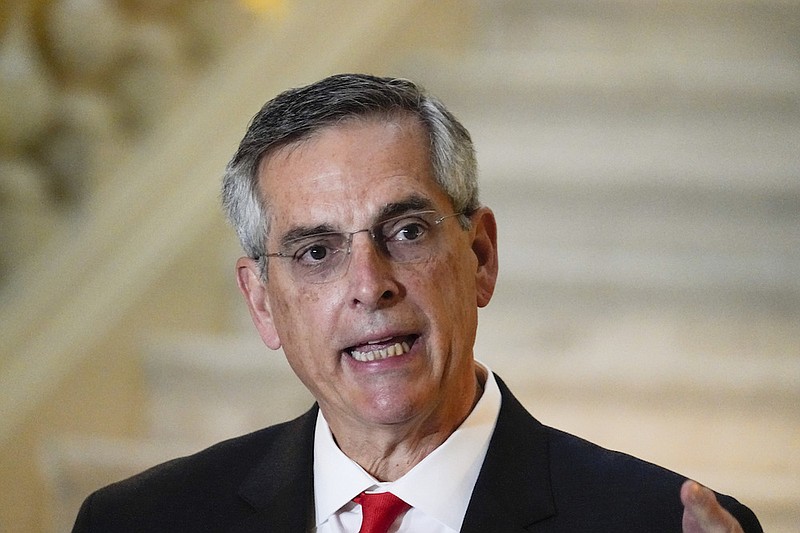In the days before our neighboring state to the south became ground zero for a controversial presidential election, a state election administrator performing a best-practice action would gather no headlines and not be rife for misdirection.
The CNN headline was this: "Georgia removes 100,000 names from voter registration roles." The Times Free Press headline put it this way: "102,000 voter registrations to be canceled."
As sure as sunrise, the accusations flew from those who know better.
"Our democracy is under attack," tweeted Robert Reich, labor secretary for former President Bill Clinton.
"Protect your vote ... . They're purging the rolls to try and redo [Georgia Gov. Brian] Kemp's subtraction tricks ...," tweeted MSNBC's Joy Reid.
The message: Georgia is trying to change the outcome in any and all future elections.
In fact, cancellations of voter registrations are required by Georgia state law to occur every other year to remove ineligible or infrequent voters from state rolls.
Of those names, 67,286 were linked to a National Change of Address form submitted to the U.S. Postal Service, 34,227 files had election mail that was returned to sender, 18,486 people representing files were dead and nearly 300 had no contact with election officials for two general elections.
Which of those would critics feel should be kept on the election rolls?
To give each of those formerly registered voters - minus the dead ones - another opportunity to raise their voices and say their inclusion was wrong, the Georgia secretary of state published a list of all 101,000-plus voters.
Two years ago, in a much larger list, 4,500 Georgia voters did raise their hands and say: "Wait."
However, the CNN report did not bother to tell its readers that the voters were removed from the rolls as a normal maintenance practice.
"In a click-driven age," Dave Wasserman of the Cook Political Report tweeted, "there's a dangerous tendency to conflate changes that are best practice/required by federal law with developments that could actually risk election subversion. Given the stakes, it's imperative for news organizations to be careful and clear."
Several other Twitter critics weren't as circumspect.
"This is journalistic malpractice," Craig Hohman wrote on CNN Politics. "You left out that this is normal and not something nefarious."
"Purging redundancies from voter lists and registration rolls is an important maintenance task," another tweeted. "It ensures greater accuracy. I recommend CNN make this clear to viewers by running a segment explaining the importance of keeping registration rolls and voter lists up to date."
The New York Times report carried by the Times Free Press did tell readers the removals "occur every other year as required by state law."
The intentional misdirection on the Georgia action by some on the left mirrors the falsehoods still routinely told about the same state's voting changes passed by the legislature earlier this year. In some report at least once a week, for instance, is the lie that the state now bans voters from having water while waiting in long election lines.
The truth, of course, is that the state only banned advocacy organizations from supplying that water to voters waiting in line. Poll workers, according to the law, can make available "self-service water from an unattended receptacle to an elector waiting in line to vote."
What is "self-service water from an unattended receptacle," you might wonder. Well, although in Tennessee, if the Collegedale early voting site for the 2020 presidential election was any indication, it involved a voter having to bend at the waist to grab a bottle of water from a plastic container on the ground or from the back of a pickup truck.
Critics of the Georgia law might deem a voter having to bend a bit to obtain the bottle is in some way discriminatory, but we believe most fair-minded people don't see it that way.
(The truth is, until the 2020 presidential election, we'd never heard of voters being supplied water or food in voting lines - and we've waited in a few doozies - much less such experiences being a "right.")
Georgia Secretary of State Brad Raffensperger, who has been made a punching bag by both parties for not finding enough voter fraud to re-elect former President Donald Trump and for enforcing actual election laws, said it's important to keep voter rolls up to date for the sake of federal, state and local elections.
"Making sure Georgia's voter rolls are up to date is key to ensuring the integrity of our elections," he said in a statement. "That is why I fought and beat [spurned 2018 Georgia gubernatorial election loser] Stacey Abrams in court in 2019 to remove nearly 300,000 obsolete voter files before the November election, and will do so again this year. Bottom line, there is no legitimate reason to keep ineligible voters on the rolls."
These are just the opening salvos for elections in 2022 and 2024. And you thought we could escape all that in 2021? Think again.
